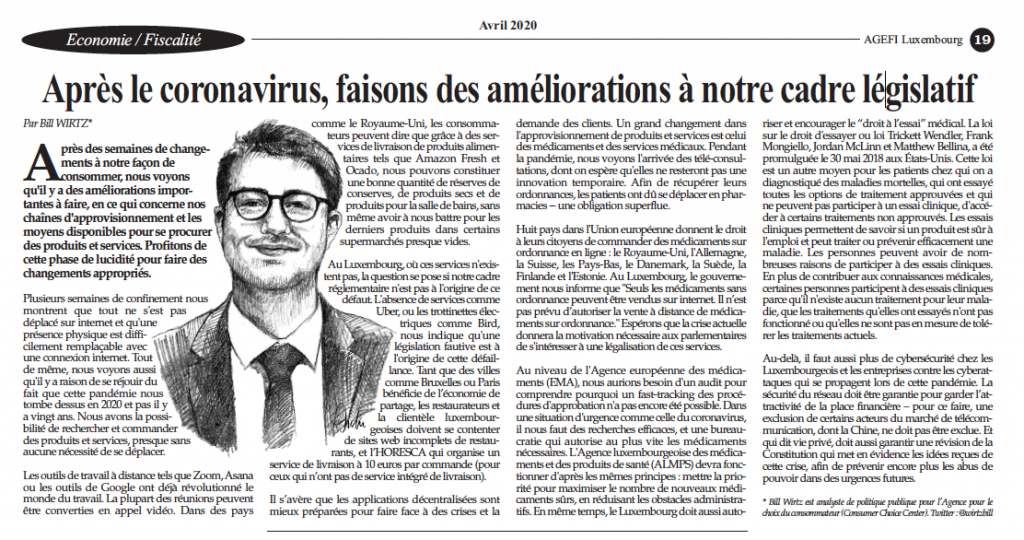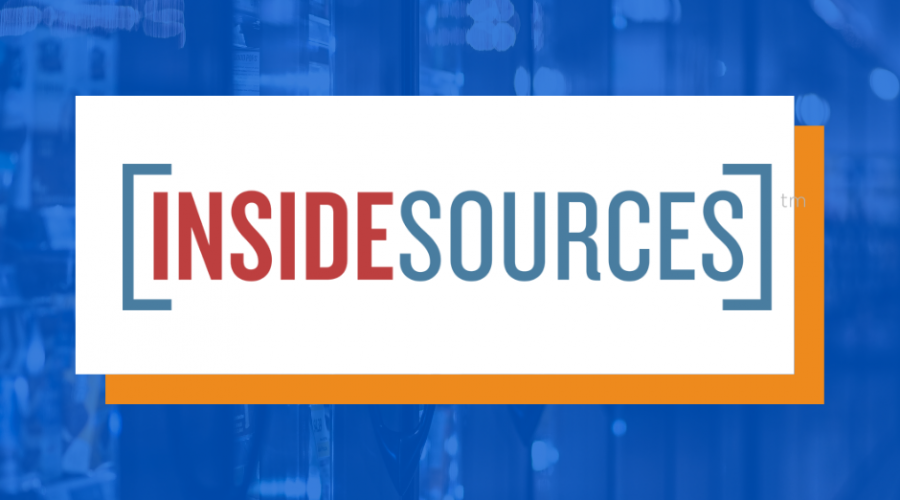Après le coronavirus, faisons des améliorations à notre cadre législatif

Après des semaines de changements à notre façon de consommer, nous voyons qu’il y a des améliorations importantes à faire, en ce qui concerne nos chaînes d’approvisionnement et les moyens disponibles pour se procurer des produits et services. Profitons de cette phase de lucidité pour faire des changements appropriés.
Plusieurs semaines de confinement nous montrent que tout ne s’est pas
déplacé sur internet et qu’une présence physique est difficilement remplaçable avec une connexion internet. Tout de même, nous voyons aussi qu’il y a raison de se réjouir du fait que cette pandémie nous tombe dessus en 2020 et pas il y a vingt ans. Nous avons la possibilité de rechercher et commander des produits et services, presque sans
aucune nécessité de se déplacer.
Les outils de travail à distance tels que Zoom, Asana ou les outils de Google ont déjà révolutionné le monde du travail. La plupart des réunions peuvent
être converties en appel vidéo. Dans des pays comme le Royaume-Uni, les consommateurs peuvent dire que grâce à des services de livraison de produits alimentaires tels que Amazon Fresh etOcado, nous pouvons constituer une bonne quantité de réserves de conserves, de produits secs et de produits pour la salle de bains, sans même avoir à nous battre pour les
derniers produits dans certains supermarchés presque vides.
Au Luxembourg, où ces services n’existent pas, la question se pose si notre cadre réglementaire n’est pas à l’origine de ce défaut. L’absence de services comme Uber, ou les trottinettes électriques comme Bird, nous indique qu’une législation fautive est à l’origine de cette défaillance. Tant que des villes comme Bruxelles ou Paris bénéficie de l’économie de partage, les restaurateurs et la clientèle luxembour- geoises doivent se contenter de sites web incomplets de restau- rants, et l’HORESCA qui organise un service de livraison à 10 euros par commande (pour ceux qui n’ont pas de service intégré de livraison).
Il s’avère que les applications décentralisées sont mieux préparées pour faire face à des crises et la demande des clients. Un grand changement dans l’approvisionnement de produits et services est celui des médicaments et des services médicaux. Pendant la pandémie, nous voyons l’arrivée des télé-consultations, dont on espère qu’elles ne resteront pas une innovation temporaire. Afin de récupérer leurs ordonnances, les patients ont dû se déplacer en pharmacies — une obligation superflue.
Huit pays dans l’Union européenne donnent le droit à leurs citoyens de commander des médicaments sur ordonnance en ligne : le Royaume-Uni, l’Allemagne, la Suisse, les Pays-Bas, le Danemark, la Suède, la Finlande et l’Estonie. Au Luxembourg, le gouvernement nous informe que “Seuls les médicaments sans ordonnance peuvent être vendus sur internet. Il n’est pas prévu d’autoriser la vente à distance de médicaments sur ordonnance.” Espérons que la crise actuelle donnera la motivation nécessaire aux parlementaires de s’intéresser à une légalisation de ces services.
Au niveau de l’Agence européenne des médicaments (EMA), nous aurions besoin d’un audit pour comprendre pourquoi un fast-tracking des procé-
dures d’approbation n’a pas encore été possible. Dans une situation d’urgence comme celle du coronavirus, il nous faut des recherches efficaces, et une bureau- cratie qui autorise au plus vite les médicaments nécessaires. L’Agence luxembourgeoise des médicaments et des produits de santé (ALMPS) devra fonctionner d’après les mêmes principes : mettre la priorité pour maximiser le nombre de nouveaux médicaments sûrs, en réduisant les obstacles administratifs. En même temps, le Luxembourg doit aussi autoriser et encourager le “droit à l’essai” médical. La loi sur le droit d’essayer ou loi Trickett Wendler, Frank Mongiello, Jordan McLinn et Matthew Bellina, a été promulguée le 30 mai 2018 aux États-Unis. Cette loi est un autre moyen pour les patients chez qui on a diagnostiqué des maladies mortelles, qui ont essayé toutes les options de traitement approuvées et qui ne peuvent pas participer à un essai clinique, d’accéder à certains traitements non approuvés. Les essais cliniques permettent de savoir si un produit est sûr à l’emploi et peut traiter ou prévenir efficacement une maladie. Les personnes peuvent avoir de nom-
breuses raisons de participer à des essais cliniques.
En plus de contribuer aux connaissances médicales, certaines personnes participent à des essais cliniques parce qu’il n’existe aucun traitement pour leur maladie, que les traitements qu’elles ont essayés n’ont pas fonctionné ou qu’elles ne sont pas en mesure de tolérer les traitements actuels.
Au-delà, il faut aussi plus de cybersécurité chez les Luxembourgeois et les entreprises contre les cyberattaques qui se propagent lors de cette pandémie. La sécurité du réseau doit être garantie pour garder l’at-
tractivité de la place financière – pour ce faire, une exclusion de certains acteurs du marché de télécommunication, dont la Chine, ne doit pas être exclue. Et qui dit vie privé, doit aussi garantir une révision de la
Constitution qui met en évidence les idées reçues de cette crise, afin de prévenir encore plus les abus de pouvoir dans des urgences futures.
The Consumer Choice Center is the consumer advocacy group supporting lifestyle freedom, innovation, privacy, science, and consumer choice. The main policy areas we focus on are digital, mobility, lifestyle & consumer goods, and health & science.
The CCC represents consumers in over 100 countries across the globe. We closely monitor regulatory trends in Ottawa, Washington, Brussels, Geneva and other hotspots of regulation and inform and activate consumers to fight for #ConsumerChoice. Learn more at consumerchoicecenter.org






